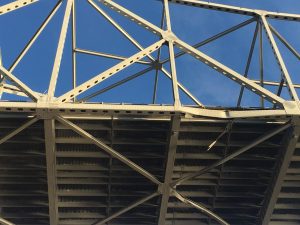Following a maritime allision that occurred on October 12, 2018, the Sunshine Bridge, which crosses the Mississippi River in southern Louisiana, has been closed due to structural damage. The repairs to the bridge are underway, but they could last until January or February of 2019, totaling nearly 100 days of non-service to local residents and $5 million dollars of bills to the State of Louisiana. Heavier consequences, however, could befall Marquette Transportation Company, the owner of the at-fault vessel.
In the last five years, Marquette vessels have collided with 32 bridges—roughly 6 collisions per year, or one collision every 2 months. This already staggering statistic becomes even more alarming when paired with the additional fact that Marquette has faced no penalty or fine for any of the incidents. It is for these reasons that the plaintiffs’ attorneys could seek punitive damages against the transportation company. According to the 2008 case Exxon v. Baker, “punitives are aimed not at compensation but principally at retribution and deterring harmful conduct.” They result from “gross negligence,” “willful, wanton, and reckless indifference for the rights of others,” or “behavior even more deplorable.” The behavior of the ship’s captain is undoubtedly negligent, for he attempted to impossibly pass underneath a bridge with a fully extended crane boom. However, the scope of the dispute at hand regards Marquette Transportation at the corporate level. Thus, one must question if negligence and/or recklessness can be found in the institution.
The Exxon case defines that “Recklessness may consist of either of two different types of conduct. In one, the actor knows, or has reason to know…of facts which create a high degree of risk of…harm to another, and deliberately proceeds to act, or to fail to act, in conscious disregard of, or indifference to, that risk. In the other, the actor has such knowledge, or reason to know, of the facts, but does not realize or appreciate the high degree of risk involved, although a reasonable man in his position would do so.” While no specific act of recklessness (at the corporate level) fitting the definition above has been brought to light, it can and must be argued that the frequency and consistency of maritime allisions involving Marquette vessels is exemplary of an institutional negligence resulting in the poor performance of its employees. In fact, the aforementioned case addresses situations in which no concrete reckless action is detected, saying that “heavier punitive awards have been thought to be justifiable when wrongdoing is hard to detect (increasing chances of getting away with it).” Maritime allisions involving Marquette vessels perhaps do not fall into the category of corporate negligence, but they are certainly evidence of it.
 Louisiana Lawyer Blog
Louisiana Lawyer Blog


